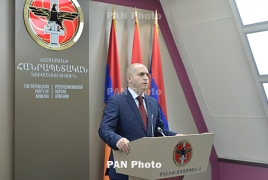Armenia's ruling RPA 'will become opposition' if Pashinyan elected: AP May 4, 2018 - 12:49 AMT PanARMENIAN.Net - Deputy head of the ruling Republican Party of Armenia Armen Ashotyan has said the RPA would “consider itself the opposition” should opposition leader Nikol Pashinyan become prime minister, despite retaining a majority of lawmakers in parliament, The Associated Press reports. After weeks of raucous protests, the streets of the Armenian capital suddenly calmed Thursday, May 3 and the ruling party confirmed it would back Pashinyan to become prime minister next week. But the deal leaves the ruling Republican Party with a solid majority in parliament, suggesting that real change in the landlocked former Soviet republic that is a key Russian ally could still be far away. In a move to calm the turmoil that has gripped Armenia for weeks, the Republican Party said it would support any candidate for premier nominated by one-third of the lawmakers in parliament — support that Pashinyan claims to have. Pashinyan then called on demonstrators to cease their protests. In an interview, Ashotyan reaffirmed the deal for the vote that is to be held Tuesday in parliament. “We had two criteria to assist any candidate. The first is a necessary threshold of signatures ... The second is to calm down the situation on the streets, not blocking interstate roads, airports, etc.,” he said. “So the man who could cope with these criteria is considered to be Nikol Pashinyan.” Ashotyan said if the streets stay calm “as agreed, we will assist his election.” Yet once Pashinyan takes the post, Armenia’s political dynamics will become complicated. Ashotyan said the Republican party would “consider itself the opposition” despite retaining a majority of lawmakers in parliament. “In my personal opinion, there is no way of any cooperation with new political forces,” he said. “We will not be part of this government.” The Yerevan protests began April 13 and spread to other parts of the country. Frustration with widespread poverty and corruption burst into anger over what demonstrators saw as longtime President Serzh Sargsyan’s power grab. Sargsyan, who was president for a decade, stepped down because of term limits but on April 17 was named prime minister. Under a shift in government structure, the premiership had become more powerful than the presidency. But as the protests against him attracted tens of thousands nightly in Yerevan’s central square, Sargsyan unexpectedly resigned just six days after being appointed prime minister. Grigoryan added that the situation around the world and particularly in the region is very difficult. The Armenian Defense Ministry has denied Azerbaijan's accusations of violating the ceasefire. Armenian Prime Minister Nikol Pashinyan took to social media to thank his Lithuanian counterpart for the contribution. President of the Armenian parliament Alen Simonyan met with the Speaker of the Azerbaijani Milli Majlis Sahiba Gafarova. Partner news |